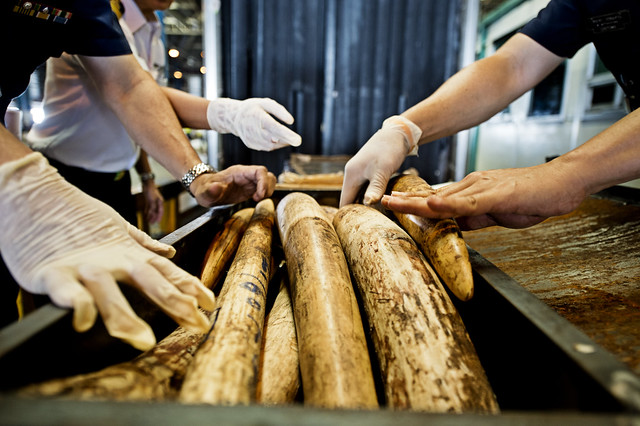世界自然保育聯盟(IUCN)檀香山世界保育大會上發表的最新大象普查結果顯示,2007年至2014年間,非洲草原象的數量銳減30%,降至14萬4000頭。
被查獲的非洲象象牙。攝影:James Morgan。圖片來源:WWF。
耗時二年的大象普查以空拍技術為主要工具,範圍囊括18個國家、34萬5000平方英里,是微軟創辦人保羅艾倫和多個政府和非政府組織合作的成果。
「跟犀牛角一樣,貧窮和腐敗加上國際市場對象牙的需求,持續驅動著國際象牙市場。平均每15分鐘就有一頭大象因為象牙被盜獵者殺害。」艾倫說。
壞消息中的好消息 普查行動促進保育
普查結果顯示,2014年至少有2萬頭大象因象牙遭盜獵,這個速度已高於大象出生率。不過,普查結果也帶來少數好消息。
艾倫指出:「不少國家保護大象有成,堪稱其他國家的典範。」像是波札納、南非、烏干達、肯亞以及布吉納法索、尼日和貝寧交界的國家公園。在坦尚尼亞和莫三比克等盜獵仍然猖獗的國家,「...普查結果促使當地官員加強保護僅存大象,也破獲盜獵犯罪網絡。」艾倫說。
保育人士表示,現在盜獵問題的範疇以及如何最有效率利用資源已經相當清楚,有關當局遏止盜獵的行動也越來越有效率。
聯合國環境署副組長蒂奥(Ibrahim Thiaw)認為大象保育仍有希望,因為部分非洲國家的大象數量減少趨緩,甚至在增加。大象保育工作也獲得越來越多來自大眾、政治界和私人企業的支持。
「非洲國家開始瞭解,活的大象比死的大象更有價值,可以發展觀光、資助教育、醫療和基礎建設,改善人們的生活並帶動經濟成長。」蒂奥說。
大象普查的結果將打擊盜獵的迫切感帶往新高。國際愛護動物基金會大象計劃主任貝爾(Jason Bell)警告,「大象減少的趨勢已經來到臨界點,要挽回大象族群,接下來的五年是關鍵。」
三項緊急措施 象牙貿易決不能合法化
貝爾提議三項緊急措施。第一是改善捐款運用的協調性,「太多工作在彼此競爭資源,太多針對輕重緩急的不同意見。」
第二,「別再想透過華盛頓公約讓象牙貿易合法化。那米比亞和辛巴威都已向第17屆締約國大會提案開放象牙貿易,提供亞洲配額。這必須停止,因為這傳遞錯誤訊息給消費者,削弱了反盜獵的努力。消費者應接受的唯一訊息是——買象牙是違法的。」
第三,「我們必須確保各種規模的反盜獵行動不只是把盜獵者擋在保護區外,更要建立社區網絡,才能有效對抗盜獵犯罪網。打擊盜獵不能再只針對盜獵者或走私者,而是整個野生動物組織犯罪。」
野生物走私是這屆世界保育大會的核心議題之一。3日的高階會議上,保育領袖探討終止野生物走私的可能解決方案。過去一週,IUCN成員探討兩大議案,一是原住民和當地社群在反非法野生物貿易中扮演的角色,二是如何鼓勵各國政府杜絕國內象牙市場,不過這個議題在IUCN成員國之間尚無共識。
Wildlife conservationists meeting in Honolulu for the IUCN’s World Conservation Congress are shocked and saddened by the release of the Great Elephant Census showing that numbers of African savanna elephants have declined by 30 percent – 144,000 elephants – between 2007 and 2014.
The Great Elephant Census is the result of a two-year-long study, the centerpiece of which was an aerial survey, the first in 40 years, that covered nearly 345,000 square miles over 18 countries.
The census was a collaboration between billionaire and Microsoft co-founder Paul G. Allen, his organization, Vulcan, and Elephants Without Borders, African Parks, the Frankfurt Zoological Society, the Wildlife Conservation Society, the Nature Conservancy, the IUCN African Elephant Specialist Group and Save the Elephants, as well as a long list of conservation officials in the countries surveyed.
“Poverty and corruption still remain very serious problems in countries that are home to the worst killing grounds, and these factors continue to drive a thriving international ivory market – along with similarly voracious demand for horns from endangered rhinos.”
“As you’ve been reading this, poachers likely killed another African elephant for its tusks – an atrocity that takes place, on average, every 15 minutes,” said Allen.
At least 20,000 elephants were killed in 2014 for their tusks, at a rate faster than they are being born, the census found.
There are a few hopeful signs that emerged from the Great Elephant Census. Said Allen, “A handful of countries are doing a pretty good job of protecting their elephants, and their approaches can serve as models for other nations whose conservation efforts have been failing.”
Relative success stories include Botswana, South Africa, Uganda, Kenya, and the complex of parks spanning the border of Burkina Faso, Niger and Benin.
Allen says that in countries where poaching is still rampant, such as Tanzania and Mozambique, “…the survey’s alarming results have spurred officials to strengthen protections for their surviving elephants, and to crack down on the criminal networks that are driving the slaughter.”
Conservationists say that now that the scope of the problem is known and locations where resources can do the most good are identified, authorities can become more effective in their approaches to eliminating the poachers.
UN Environment deputy head Ibrahim Thiaw sees reasons for hope, pointing out that elephant populations in some African nations are declining only slightly or even increasing. And support for tackling the crisis is increasingly backed by a growing public, political and private sector force for change – such as the Wild For Life campaign.
“Across Africa, nations are starting to see that wildlife is worth more alive than dead, and that it can generate revenue, through tourism for example, to fund the education, health care and infrastructure that will improve human well-being and drive economic growth,” said Thiaw.
The alarming results of the Great Elephant Census have raised the urgency of the fight against poachers to new heights.
Jason Bell, director for the International Fund for Animal Welfare’s Elephant Program, warned, “Elephants have reached the tipping point and the next five years are critical if we want to turn this around.”
Bell is offering three urgent measures for immediate consideration.
First, he said, coordination of the the money made available through the donor community to address poaching and trafficking must be greatly improved as there is “a lot of competition for resources and different views of what the priorities are.”
Second, said Bell, “We have to stop toying with the idea of renewed legal sales of ivory through the Convention on International Trade in Endangered Species, CITES. Both Namibia and Zimbabwe have put forward proposals to the 17th Conference of the Parties to CITES, to be held in Johannesburg in September, to deregulate the ivory trade to allow for quota sales to Asian markets. This has to stop.”
“It continues to send the wrong signals to consumers and undermine on-the-ground efforts to combat poaching,” said Bell. “The only message any potential consumer should get right now is that it is illegal to purchase ivory.”
Third, he said, “we must ensure that all efforts to address poaching, at any scale, are not only focused on keeping poachers out of parks, but on building a network of communities to combat and defeat the criminal networks.”
“It can no longer be about just the poacher or the trafficker, it has to be about the unravelling the organized criminal syndicates involved in wildlife crime,” said Bell.
As the latest global conservation agenda emerges at the IUCN Congress in Honolulu, wildlife trafficking is among the key issues on everyone’s mind.
Conservation leaders explored solutions during the high level session on Saturday, “Everybody’s Business: Ending Wildlife Trafficking.”
This week, IUCN Members will debate two motions that address this critical issue. Recognizing, understanding and enhancing the role of indigenous peoples and local communities in tackling the illegal wildlife trade crisis is the subject of one of the motions.
The second is a motion that encourages all governments to close their domestic ivory markets. The illegal killing of elephants for their ivory is a problem across much of Africa, and there is a call for countries around the world to close their domestic ivory markets in response. Yet, there is no unanimity among IUCN Members on the issue – a vote is expected this week.
※ 全文及圖片詳見:ENS





